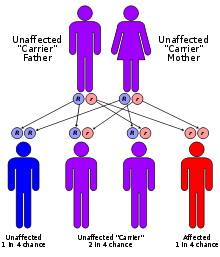- Meckel syndrome
-
Meckel syndrome Classification and external resources ICD-10 Q61.9 OMIM 249000 DiseasesDB 31661 eMedicine ped/1390 Meckel syndrome (also known as Meckel–Gruber Syndrome, Gruber Syndrome, Dysencephalia Splanchnocystica) is a rare, lethal, ciliopathic, genetic disorder, characterized by renal cystic dysplasia, central nervous system malformations, polydactyly, hepatic developmental defects, and pulmonary hypoplasia due to oligohydramnios.
Meckel-Gruber syndrome is named for Johann Meckel and Georg Gruber.[1][2][3]
Contents
Diagnosis
Dysplastic kidneys are prevalent in 95% to 100% of all identified cases. When this occurs, microscopic cysts develop within the kidney and slowly destroy it, causing it to enlarge to 10 to 20 times its original size. The level of amniotic fluid within the womb may be significantly altered or remain normal, and a normal level of fluid should not be criteria for exclusion of diagnosis.[citation needed]
Occipital encephalocele is present in 60% to 80% of all cases, and post-axial polydactyly is present in 55% to 75% of the total number of identified cases. Bowing or shortening of the limbs are also common.[citation needed]
Finding at least two of the three features of the classical triad, in the presence of normal karyotype, makes the diagnosis solid. Regular ultrasounds and pro-active prenatal care can usually detect symptoms early on in a pregnancy.[citation needed]
Pathophysiology
Meckel–Gruber syndrome (MKS) is an autosomal recessive lethal malformation. Recently, two MKS genes, MKS1 and MKS3, have been identified. A study done recently has described the cellular, sub-cellular and functional characterization of the novel proteins, MKS1 and meckelin, encoded by these genes.[4] The malfunction of this protein production is mainly responsible for this lethal disorder.
Type OMIM Gene MKS1 609883 MKS1 MKS2 603194 TMEM216 MKS3 607361 TMEM67 MKS4 611134 CEP290 MKS5 611561 RPGRIP1L MKS6 612284 CC2D2A Relation to other rare genetic disorders
Recent findings in genetic research have suggested that a large number of genetic disorders, both genetic syndromes and genetic diseases, that were not previously identified in the medical literature as related, may be, in fact, highly related in the genetypical root cause of the widely-varying, phenotypically-observed disorders. Thus, Meckel–Gruber syndrome is a ciliopathy. Other known ciliopathies include primary ciliary dyskinesia, Bardet–Biedl syndrome, polycystic kidney and liver disease, nephronophthisis, Alstrom syndrome, and some forms of retinal degeneration.[5] The MKS1 gene has been explicitly identified as a ciliopathy.[6]
Incidence
While not precisely known, it is estimated that the general rate of incidence, according to Bergsma,[7] for Meckel syndrome is 0.02 per 10,000 births. According to another study done six years later, the incidence rate could vary from 0.07 to 0.7 per 10,000 births.[8]
This syndrome is a Finnish heritage disease. Its frequency is much higher in Finland, where the incidence is as high as 1.1 per 10,000 births. It is estimated that Meckel syndrome accounts for 5% of all neural tube defects there.[9]
References
- ^ synd/2055 at Who Named It?
- ^ J. F. Meckel. Beschreibung zweier durch sehr ähnliche Bildungsabweichungen entstellter Geschwister. Deutsches Archiv für Physiologie, 1822, 7: 99–172.
- ^ G. B. Gruber. Beiträge zur Frage "gekoppelter" Missbildungen (Akrocephalossyndactylie und Dysencephalia splancnocystica. Beitr path Anat, 1934, 93: 459–476.
- ^ Dawe, H.R.; Smith, U.M., Cullinane, A.R., Gerrelli, D., Cox, P., Badano, J.L., Blair-Reid, S., Sriram, N., Katsanis, N., Attie-Bitach, T., Afford, S.C., Copp, A.J., Kelly, D.A., Gull, K. and Johnson, C.A. (2007). "The Meckel–Gruber Syndrome proteins MKS1 and meckelin interact and are required for primary cilium formation". Human Molecular Genetics 16 (2): 173–186. doi:10.1093/hmg/ddl459. PMID 17185389. http://hmg.oxfordjournals.org/cgi/content/short/16/2/173?rss=1.
- ^ Badano, Jose L.; Norimasa Mitsuma, Phil L. Beales, Nicholas Katsanis (Sep 2006). "The Ciliopathies : An Emerging Class of Human Genetic Disorders". Annual Review of Genomics and Human Genetics 7: 125–148. doi:10.1146/annurev.genom.7.080505.115610. PMID 16722803. http://arjournals.annualreviews.org/doi/abs/10.1146/annurev.genom.7.080505.115610. Retrieved 2008-06-15.
- ^ Kyttälä, Mira (2006-05) (pdf). Identification of the Meckel Syndrome Gene (MKS1) Exposes a Novel Ciliopathy. National Public Health Institute, Helsinki. http://www.ktl.fi/attachments/suomi/julkaisut/julkaisusarja_a/2006/2006a05.pdf. Retrieved 2008-07-06.
- ^ Bergsma, D. (1979). "Birth Defects". Atlas and Compendium. London: Macmillan Press.
- ^ Salonen, R.; Norio, R.; Reynolds, James F. (1984). "The Meckel syndrome: Clinicopathological Findings in 67 Patients". American Journal of Medical Genetics 18 (4): 671–689. doi:10.1002/ajmg.1320180414. PMID 6486167.
- ^ Nyberg, D. A.; et al. (1990). "Meckel–Gruber syndrome; Importance of Prenatal Diagnosis". Journal of Ultrasound Medicine 9: 691–696.
Congenital malformations and deformations of urinary system (Q60–Q64, 753) Abdominal KidneyPelvic Vestigial Genetic disorder, organelle: Ciliopathy Structural receptor: Polycystic kidney disease
cargo: Asphyxiating thoracic dysplasia
basal body: Bardet–Biedl syndrome
mitotic spindle: Meckel syndrome
centrosome: Joubert syndromeSignaling Other/ungrouped Alström syndrome · Primary ciliary dyskinesia · Senior–Løken syndrome · Orofaciodigital syndrome 1 · McKusick–Kaufman syndrome · Autosomal recessive polycystic kidneysee also ciliary proteins
B structural (perx, skel, cili, mito, nucl, sclr) · DNA/RNA/protein synthesis (drep, trfc, tscr, tltn) · membrane (icha, slcr, atpa, abct, othr) · transduction (iter, csrc, itra), trfkCategories:- Rare diseases
- Autosomal recessive disorders
- Neurological disorders
- Hepatology
- Nephrology
- Congenital disorders of urinary system
- Ciliopathy
Wikimedia Foundation. 2010.

